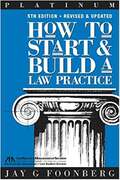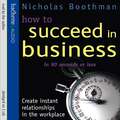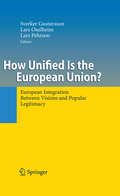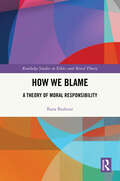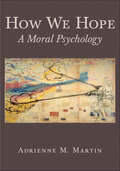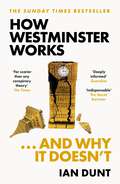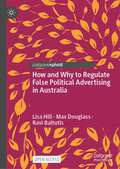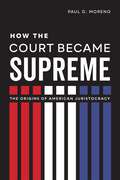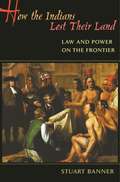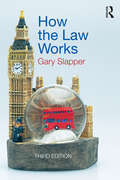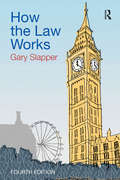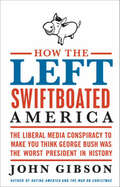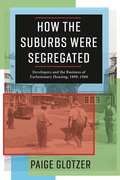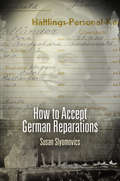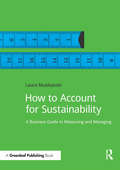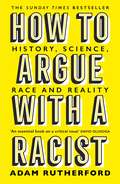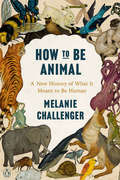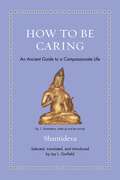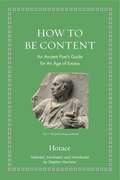- Table View
- List View
How To Start and Build a Law Practice
by Jay G. FoonbergA classic ABA bestseller, How to Start and Build a Law Practice has been used by tens of thousands of lawyers as the comprehensive guide to planning, launching, and growing a successful practice. Author Jay G Foonberg, now in his fifth decade of practicing law, has always been dedicated to giving other lawyers the benefit of his wealth of experience. This Platinum Fifth Edition is packed with over 600 pages of guidance on identifying the right location, finding clients, setting fees, managing your office, maintaining an ethical and responsible practice, maximizing available resources, upholding your standards, and much more. If you’re committed to starting—and growing— your own practice, this one book will give you the expert advice you need to make it succeed. More than 100,000 lawyers have turned to Jay Foonberg for the secrets to running a successful law firm; now you can, too, with the new Platinum Fifth Edition. <P><P> Jay Foonberg has organized the book into short, easy-to-read chapters that deal with all the specific challenges you will encounter when you open your office. The answers you'll get are realistic, practical, and based on real-life experience. You’ll find a wealth of tips that can improve your practice once it is up and running, as well as dozens of time-saving templates and checklists. In addition, there is all-new material for this edition, covering topics including: <P><P> New opportunities for serving senior clients and the growth of elder law E-mail and the Internet Law firm mergers and dissolutions The increasing size of student loans Opportunities created by an aging population Nonlawyer consultants The globalization of legal practice When and how to safely close and destroy files The aggressive marketing being done now by firms of all sizes And much more! Even if you already have an established practice, you are sure to find information that will help you compete and succeed. This is the one book you’ll need to build and grow your practice.
How To Succeed In Business In 90 Seconds Or Less
by Nicholas BoothmanPersuade a client to buy what you're selling. Energise the boss to act on your ideas. Rally the staff to see themselves as members of your team. No matter what the situation, success in business depends on having effective relationships. Nicholas Boothman's first book, HOW TO MAKE PEOPLE LIKE YOU IN 90 SECONDS OR LESS was a huge success. Now Boothman brings his innovative system of forging instant connections to the workplace. This is a book that deals not only with the importance of making a great first impression, but also with ongoing business relationships. Based on the breakthrough idea of rapport by design' HOW TO SUCCEED IN BUSINESS shows how to mine the potential in every situation, from an accidental meeting at the water cooler, to a brainstorming session, to a formal presentation before a large group. It digs into the fundamentals of persuasion, purpose and personality to get to the basis of self-confidence and effective communication. It covers traditional business concerns of team building, email and phone relationships and managing up and managing down.
How Unified Is the European Union?
by Sverker Gustavsson Lars Pehrson Lars OxelheimThe European project has come a long way in establishing peace, creating a common market, and expanding its borders. At the same time, diminishing popular legitimacy has spurred talk about a European Union in crisis. How far has the EU really come in fulfilling its grand visions? Is the project barely half-way? Or could we say with some confidence that European integration is solidified and will continue to get stronger? This book brings together contributors from economics, political science and law to offer different perspectives on this larger issue. The questions asked include: How far has the European Union come in its creation of a Common Foreign and Security Policy? What will happen to the state monopolies? Is there a common strategy at the European level for integrating immigrants? To what extent do national political parties cooperate with the Europarties? By investigating these and similar issues the book contributes to an assessment of how successful European integration has been to date.
How Walmart Is Destroying America (And the World): And What You Can Do about It
by Bill QuinnAfter carving up the once lovingly cared-for downtowns of Small Town America, Wal-Mart launched a frontal assault on mom-and-pop businesses all over the globe. With 1.5 million employees operating more than 3, 500 stores, Wal-Mart is now the world'¬?s largest private employer. In this third edition of How Wal-Mart Is Destroying America (and the World), intrepid Texas newspaperman Bill Quinn continues the fight. Featuring detailed accounts of Wal-Mart'¬?s questionable business practices and the latest information on Wal-Mart lawsuits, vendor issues, and efforts to stop expansion, Quinn shows why Wal-Mart Stores, Inc., is arguably the most feared and despised corporation in the world. Whether you'¬?re a customer fed up with Wal-Mart'¬?s false claims, a vendor squeezed by strong-arm tactics, a worker pushed to increase the Waltons'¬? bottom line, or a concerned citizen trying to save your hometown, this book will show you how to get Wal-Mart off your back and out of your backyard.BILL QUINN is a World War II veteran, retired newspaperman, and certified anti-Wal-Mart crusader. He lives with his wife, Lennie, in Grand Saline,Texas.From the Trade Paperback edition.
How We Blame: A Theory of Moral Responsibility (Routledge Studies in Ethics and Moral Theory)
by Bana BashourThis book presents a naturalistic account of moral responsibility that is neutral on the metaphysics of free will. It engages with empirical literature in experimental philosophy and psychology and draws on real-life case studies to illuminate the author’s theory of moral responsibility. The author argues that agency requires an understanding of moral responsibility attributions, which requires that one understands one’s intentional states and those of others. Further, she argues that a justified attribution of moral responsibility involves justified attributions of intentional states and justified perceptions of norm violations. This claim is novel because when moral responsibility is indexed to a particular onlooker, the discussion becomes one about whether a blamer is justified in attributing moral responsibility to the blamed. Another distinctive feature of the author’s account is that it makes room for cultural variability in our justifications of moral responsibility; those in different cultures may have different norms or expectations of one another. The first part of the book argues for a theoretical account of agency and moral responsibility while making distinctions between those and one’s theory of punishment. While justified attributions are interpersonal, theories of punishment are institutional and societal in nature. The second part of the book goes into the literature from empirical psychology and experimental philosophy on the nature of moral responsibility. How We Blame will appeal to philosophers and psychologists interested in the issue of moral responsibility.
How We Hope: A Moral Psychology
by Adrienne M. MartinWhat exactly is hope and how does it influence our decisions? In How We Hope, Adrienne Martin presents a novel account of hope, the motivational resources it presupposes, and its function in our practical lives. She contends that hoping for an outcome means treating certain feelings, plans, and imaginings as justified, and that hope thereby involves sophisticated reflective and conceptual capacities. Martin develops this original perspective on hope--what she calls the "incorporation analysis"--in contrast to the two dominant philosophical conceptions of hope: the orthodox definition, where hoping for an outcome is simply desiring it while thinking it possible, and agent-centered views, where hoping for an outcome is setting oneself to pursue it. In exploring how hope influences our decisions, she establishes that it is not always a positive motivational force and can render us complacent. She also examines the relationship between hope and faith, both religious and secular, and identifies a previously unnoted form of hope: normative or interpersonal hope. When we place normative hope in people, we relate to them as responsible agents and aspire for them to overcome challenges arising from situation or character. Demonstrating that hope merits rigorous philosophical investigation, both in its own right and in virtue of what it reveals about the nature of human emotion and motivation, How We Hope offers an original, sustained look at a largely neglected topic in philosophy.
How We Treat the Sick
by Michael MandelstamNo official statistics are kept for the number of hospital patients, in particular older people, who are subjected to neglect and abuse. That is, left malnourished and dehydrated, in pain, allowed to develop agonising and fatal pressure sores, not taken to the toilet, left to lie in their own bodily waste, cared for in a filthy environment and at risk of infection, ignored, allowed to fall over repeatedly, not spoken to, left naked or dressed in other patients' clothes - and discharged from hospital prematurely. This book bears witness to all these practices and more. Setting out a wealth of evidence not previously brought together, Michael Mandelstam shows beyond question that neglectful care is a systemic blight, rather than mere local blemish, within our health services. He analyses the causes and factors involved, reveals the widespread denial and lack of accountability on the part of those responsible - and spells out the political, moral, professional and legal implications of this failure to care for the most vulnerable of patients with humanity and compassion. Most important, Mandelstam points to the main obstacles to a solution - and to how they can be removed and change be accomplished. This book should be read by anyone concerned with the state of our health services, including National Health Service users, government policy makers and planners, public health practitioners and academics and researchers.
How Westminster Works . . . and Why It Doesn't: The instant Sunday Times bestseller from the ultimate political insider
by Ian DuntWhy do some prime ministers manage to get things done, while others miserably fail? What is a 'special adviser' and how did they take over British political life? And why is the House of Lords more functional than most people think?Most of us have a sense that our political system doesn't seem to work, but struggle to articulate exactly why. And for good reason: our political and financial institutions are cloaked in secrecy, archaic terminology, ancient custom and impenetrable jargon. Now, expert political journalist Ian Dunt is lifting the lid on British politics to expose every aspect of the setup in a way that can be understood and challenged. From Downing Street to Whitehall, the Commons to the Lords, this book is an indispensable guide to our political system - and how we might begin to fix it.
How Westminster Works . . . and Why It Doesn't: The instant Sunday Times bestseller from the ultimate political insider
by Ian DuntWhy do some prime ministers manage to get things done, while others miserably fail? What is a 'special adviser' and how did they take over British political life? And why is the House of Lords more functional than most people think?Most of us have a sense that our political system doesn't seem to work, but struggle to articulate exactly why. And for good reason: our political and financial institutions are cloaked in secrecy, archaic terminology, ancient custom and impenetrable jargon. Now, expert political journalist Ian Dunt is lifting the lid on British politics to expose every aspect of the setup in a way that can be understood and challenged. From Downing Street to Whitehall, the Commons to the Lords, this book is an indispensable guide to our political system - and how we might begin to fix it.
How and Why to Regulate False Political Advertising in Australia
by Lisa Hill Max Douglass Ravi BaltutisThis open access book represents the first comprehensive, Australia-focused treatment of the problem of false election information disseminated for the purpose of gaining an electoral advantage. It explores cautious legal regulation as the most effective and decisive approach to the issue. In doing so, the book demonstrates that, although experiments with such remedies have met with mixed success elsewhere, they are nevertheless viable, especially in Australia where they have strong public support and are able to withstand constitutional challenge.
How the Court Became Supreme: The Origins of American Juristocracy
by Paul D. MorenoOver the course of its history, the United States Supreme Court has emerged as the most powerful judiciary unit the world has ever seen. Paul D. Moreno’s How the Court Became Supreme offers a deep dive into its transformation from an institution paid little notice by the American public to one whose decisions are analyzed and broadcast by major media outlets across the nation. The Court is supreme today not just within the judicial branch of the federal government but also over the legislative and executive branches, effectively possessing the ability to police elections and choose presidents. Before 1987, nearly all nominees to the Court sailed through confirmation hearings, often with little fanfare, but these nominations have now become pivotal moments in the minds of voters. Complaints of judicial primacy range across the modern political spectrum, but little attention is given to what precisely that means or how it happened. What led to the ascendancy of America’s highest court? Moreno seeks to answer this question, tracing the long history of the Court’s expansion of influence and examining how the Court envisioned by the country’s Founders has evolved into an imperial judiciary. The US Constitution contains a multitude of safeguards to prevent judicial overreach, but while those measures remain in place today, most have fallen into disuse. Many observers maintain that the Court exercises legislative or executive power under the guise of judicial review, harming rather than bolstering constitutional democracy. How the Court Became Supreme tells the story of the origin and development of this problem, proposing solutions that might compel the Court to embrace its more traditional role in our constitutional republic.
How the Indians Lost Their Land: Law and Power on the Frontier
by Stuart BannerBetween the early seventeenth century and the early twentieth,nearly all the land in the United States was transferred from AmericanIndians to whites. This dramatic transformation has been understood in two very different ways--as a series of consensual transactions, but also as a process of violent conquest. Both views cannot be correct. How did Indians actually lose their land? Stuart Banner provides the first comprehensive answer. He argues that neither simple coercion nor simple consent reflects the complicated legal history of land transfers. Instead, time, place, and the balance of power between Indians and settlers decided the outcome of land struggles. As whites' power grew, they were able to establish the legal institutions and the rules by which land transactions would be made and enforced. This story of America's colonization remains a story of power, but a more complex kind of power than historians have acknowledged. It is a story in which military force was less important than the power to shape the legal framework within which land would be owned. As a result, white Americans--from eastern cities to the western frontiers--could believe they were buying land from the Indians the same way they bought land from one another. How the Indians Lost Their Land dramatically reveals how subtle changes in the law can determine the fate of a nation, and our understanding of the past.
How the Law Works
by Gary SlapperHow the Law Works is a refreshingly clear and reliable guide to the legal system in the UK. Offering interesting and comprehensive coverage, it makes sense of all the curious features of the law in day to day life and in current affairs. Explaining the law and legal jargon in plain English, it provides an accessible entry point to the different types of law and legal techniques, as well as the impact of European law and human rights law. In addition to explaining the role of judges, lawyers, juries and parliament, it clarifies the mechanisms behind criminal and civil law. How the Law Works is essential reading for anyone approaching law for the first time, or for anyone who is interested in an engaging introduction to the subject’s bigger picture.
How the Law Works
by Gary Slapper‘How the Law Works is a gem of a book, for law students and for everyone else. It is a must read for anyone interested in how society is shaped and controlled via law.’ Dr Steven Vaughan, solicitor, Senior Lecturer, Birmingham Law School ‘How the Law Works is a comprehensive, witty and easy-to-read guide to the law. I thoroughly recommend it to non-lawyers who want to improve their knowledge of the legal system and to potential students as an introduction to the law of England and Wales.’ HH Judge Lynn Tayton QC Reviews of the first edition: ‘A friendly, readable and surprisingly entertaining overview of what can be a daunting and arcane subject to the outsider.’ The Law Teacher ‘An easy-to-read, fascinating book . . . brimful with curios, anecdote and explanation.’ The Times How the Law Works is a refreshingly clear and reliable guide to today’s legal system. Offering interesting and comprehensive coverage, it makes sense of all the curious features of the law in day to day life and in current affairs. Explaining the law and legal jargon in plain English, it provides an accessible entry point to the different types of law and legal techniques, as well as today’s compensation culture and human rights law. In addition to explaining the role of judges, lawyers, juries and parliament, it clarifies the mechanisms behind criminal and civil law. How the Law Works is essential reading for anyone approaching law for the first time, or for anyone who is interested in an engaging introduction to the subject’s bigger picture.
How the Left Swiftboated America: The Liberal Media Conspiracy to Make You Think George Bush Was the Worst President in History
by John GibsonIn How the Left Swiftboated America, FOX commentator and bestselling author John Gibson offers the first comprehensive defense of the Bush presidency against its numerous detractors. In this provocative political work, Gibson explores who was right and who was wrong in taking us into the Iraq War and a host of other issues, arguing that it was the Left that actually lied while claiming to expose the truth.
How the Pro-Choice Movement Saved America: Freedom, Politics, and the War on Sex
by Christina PageWith a new preface by the author. In the tradition of Backlash and The Morning After, and in a political climate where Roe v. Wade is in serious jeopardy, a young activist reveals that the Pro-Life Movement’s real agenda is a war on contraception, family planning, and sexual freedom.
How the Suburbs Were Segregated: Developers and the Business of Exclusionary Housing, 1890–1960 (Columbia Studies in the History of U.S. Capitalism)
by Paige GlotzerThe story of the rise of the segregated suburb often begins during the New Deal and the Second World War, when sweeping federal policies hollowed out cities, pushed rapid suburbanization, and created a white homeowner class intent on defending racial barriers. Paige Glotzer offers a new understanding of the deeper roots of suburban segregation. The mid-twentieth-century policies that favored exclusionary housing were not simply the inevitable result of popular and elite prejudice, she reveals, but the culmination of a long-term effort by developers to use racism to structure suburban real estate markets.Glotzer charts how the real estate industry shaped residential segregation, from the emergence of large-scale suburban development in the 1890s to the postwar housing boom. Focusing on the Roland Park Company as it developed Baltimore’s wealthiest, whitest neighborhoods, she follows the money that financed early segregated suburbs, including the role of transnational capital, mostly British, in the U.S. housing market. She also scrutinizes the business practices of real estate developers, from vetting homebuyers to negotiating with municipal governments for services. She examines how they sold the idea of the suburbs to consumers and analyzes their influence in shaping local and federal housing policies. Glotzer then details how Baltimore’s experience informed the creation of a national real estate industry with professional organizations that lobbied for planned segregated suburbs. How the Suburbs Were Segregated sheds new light on the power of real estate developers in shaping the origins and mechanisms of a housing market in which racial exclusion and profit are still inextricably intertwined.
How the U.S. Government Works: ...and how it all comes together to make a nation
by Syl Sobel J.D.This updated, easy-to-read book about the United States for kids explains the federal system as it works today. It also discusses why the framers of the Constitution created the U.S. government in the 18th century and the purposes it was designed to serve.Parents, teachers, and gift givers will find:an easy-to-read book about a complex subject revised for the classroom and homecurriculum aligned vocabulary, expanded glossary, discussion questions, and resource guideinformation on how presidents and other officials are elected or appointedDescribed are the Legislative branch, composed of the Senate and the House of Representatives; the Executive branch, headed by the President with the Cabinet members; and the Judicial branch, comprised of the Supreme Court of the United States and the lower federal courts throughout the nation.
How to Accept German Reparations
by Susan SlyomovicsIn a landmark process that transformed global reparations after the Holocaust, Germany created the largest sustained redress program in history, amounting to more than $60 billion. When human rights violations are presented primarily in material terms, acknowledging an indemnity claim becomes one way for a victim to be recognized. At the same time, indemnifications provoke a number of difficult questions about how suffering and loss can be measured: How much is an individual life worth? How much or what kind of violence merits compensation? What is "financial pain," and what does it mean to monetize "concentration camp survivor syndrome"?Susan Slyomovics explores this and other compensation programs, both those past and those that might exist in the future, through the lens of anthropological and human rights discourse. How to account for variation in German reparations and French restitution directed solely at Algerian Jewry for Vichy-era losses? Do crimes of colonialism merit reparations? How might reparations models apply to the modern-day conflict in Israel and Palestine? The author points to the examples of her grandmother and mother, Czechoslovakian Jews who survived the Auschwitz, Plaszow, and Markkleeberg camps together but disagreed about applying for the post-World War II Wiedergutmachung ("to make good again") reparation programs. Slyomovics maintains that we can use the legacies of German reparations to reconsider approaches to reparations in the future, and the result is an investigation of practical implications, complicated by the difficult legal, ethnographic, and personal questions that reparations inevitably prompt.
How to Account for Sustainability: A Simple Guide to Measuring and Managing (Doshorts Ser.)
by Laura MusikanskiLearn how to measure, manage and account for sustainability in your business in clear, simple and feasible steps.This book takes you from concept to innovation and back to action items for all aspects of sustainability. Each chapter has four sections: (1) a specific description of sustainability challenges, (2) an example of a business making a profit by sustainability problem, (3) an exercise challenging the reader to identify business solutions and (4) clear, simple takeaways.The book is structured around the world’s most accepted guidelines for sustainability reporting, the Global Reporting Initiative.
How to Argue With a Meat Eater (And Win Every Time)
by Ed WintersAn empowering and deeply informative book – MobyNEW UPDATED EDITIONChallenge their beliefs; change the worldIf you are a vegan, you’ll know all too well how provocative it can be – you never know when you’ll be challenged or how. But being able to face down and rebut arguments against veganism is hugely important. Not just because many of the arguments lack substance, but because every interaction provides a pivotal moment to create change.Now with 7 new arguments, How to Argue With a Meat Eater will teach you to not only become a skilled debater, sharing the secrets of renowned vegan educator Ed Winters, but it will arm you with powerful facts and insights that will give pause to even the most devout meat eater.Providing you with the knowledge to become a better conversationalist and critical thinker, and the motivation to create a more ethical, kind and sustainable world, let this book be your guide and inspiration to know that, no matter what the argument, you can win every time.
How to Argue With a Racist: History, Science, Race and Reality
by Adam RutherfordTHE SUNDAY TIMES BESTSELLER'Nobody deals with challenging subjects more interestingly and compellingly than Adam Rutherford, and this may be his best book yet. This is a seriously important work' BILL BRYSON'A fascinating and timely refutation of the casual racism on the rise around the world. The ultimate anti-racism guide for data-lovers everywhere' CAROLINE CRIADO PEREZ ***Race is real because we perceive it. Racism is real because we enact it. But the appeal to science to strengthen racist ideologies is on the rise - and increasingly part of the public discourse on politics, migration, education, sport and intelligence. Stereotypes and myths about race are expressed not just by overt racists, but also by well-intentioned people whose experience and cultural baggage steer them towards views that are not supported by the modern study of human genetics. Even some scientists are uncomfortable expressing opinions deriving from their research where it relates to race. Yet, if understood correctly, science and history can be powerful allies against racism, granting the clearest view of how people actually are, rather than how we judge them to be.HOW TO ARGUE WITH A RACIST is a vital manifesto for a twenty-first century understanding of human evolution and variation, and a timely weapon against the misuse of science to justify bigotry.
How to Be Animal: A New History of What It Means to Be Human
by Melanie Challenger&“A brilliant, thought-provoking book.&” —Matt Haig, New York Times bestselling author of The Midnight Library A wide-ranging take on why humans have a troubled relationship with being an animal, and why we need a better oneHuman are the most inquisitive, emotional, imaginative, aggressive, and baffling animals on the planet. But we are also an animal that does not think it is an animal. How well do we really know ourselves?How to Be Animal tells a remarkable story of what it means to be human and argues that at the heart of our existence is a profound struggle with being animal. We possess a psychology that seeks separation between humanity and the rest of nature, and we have invented grand ideologies to magnify this. As well as piecing together the mystery of how this mindset evolved, Challenger's book examines the wide-reaching ways in which it affects our lives, from our politics to the way we distance ourselves from other species. We travel from the origin of homo sapiens through the agrarian and industrial revolutions, the age of the internet, and on to the futures of AI and human-machine interface. Challenger examines how technology influences our sense of our own animal nature and our relationship with other species with whom we share this fragile planet.That we are separated from our own animality is a delusion, according to Challenger. Blending nature writing, history, and moral philosophy, How to Be Animal is both a fascinating reappraisal of what it means to be human, and a robust defense of what it means to be an animal.
How to Be Caring: An Ancient Guide to a Compassionate Life (Ancient Wisdom for Modern Readers)
by ShantidevaA vivid new translation of selections from an inspiring guide to self-transformation through kindness by an eighth-century Buddhist monkWritten by the medieval Indian Buddhist monk Shantideva, The Bodhicaryavatara is one of the most beloved and frequently taught works in Buddhism and a favorite of the Dalai Lama. An inspiring and powerful poem that uses a gripping, first-person, confessional voice, it is the most systematic work of ethical thought in the Indo-Tibetan Buddhist tradition. And its invaluable insights, exhortations, and encouragements about how we can relieve suffering by becoming more caring and compassionate are universal. In How to Be Caring, philosopher and Buddhist scholar Jay Garfield presents a lively new translation of selected verses from Shantideva&’s text that capture its powerful lessons for all of us. The result is the clearest, most concise, and most accessible introduction to this masterful Buddhist guidebook about how we can change the world by changing ourselves.Focusing on the life of a bodhisattva, a person committed to attaining awakening for the benefit of all beings, Shantideva argues that the first step to reducing suffering and making the world better is to conquer our own psychopathologies. Urging us to remember that we won&’t live forever and therefore need to think about what is most important, the work seeks to inspire us and teach us how to be more generous, thoughtful, polite, patient, committed, and self-aware. Featuring an introduction and the original Tibetan text on facing pages, this dazzling volume is filled with wisdom that still speaks directly to readers today.
How to Be Content: An Ancient Poet's Guide for an Age of Excess (Ancient Wisdom for Modern Readers)
by Horace Stephen HarrisonWhat the Roman poet Horace can teach us about how to live a life of contentment What are the secrets to a contented life? One of Rome’s greatest and most influential poets, Horace (65–8 BCE) has been cherished by readers for more than two thousand years not only for his wit, style, and reflections on Roman society, but also for his wisdom about how to live a good life—above all else, a life of contentment in a world of materialistic excess and personal pressures. In How to Be Content, Stephen Harrison, a leading authority on the poet, provides fresh, contemporary translations of poems from across Horace’s works that continue to offer important lessons about the good life, friendship, love, and death.Living during the reign of Rome’s first emperor, Horace drew on Greek and Roman philosophy, especially Stoicism and Epicureanism, to write poems that reflect on how to live a thoughtful and moderate life amid mindless overconsumption, how to achieve and maintain true love and friendship, and how to face disaster and death with patience and courage. From memorable counsel on the pointlessness of worrying about the future to valuable advice about living in the moment, these poems, by the man who famously advised us to carpe diem, or “harvest the day,” continue to provide brilliant meditations on perennial human problems.Featuring translations of, and commentary on, complete poems from Horace’s Odes, Satires, Epistles, and Epodes, accompanied by the original Latin, How to Be Content is both an ideal introduction to Horace and a compelling book of timeless wisdom.
